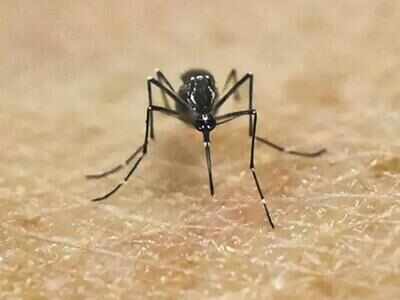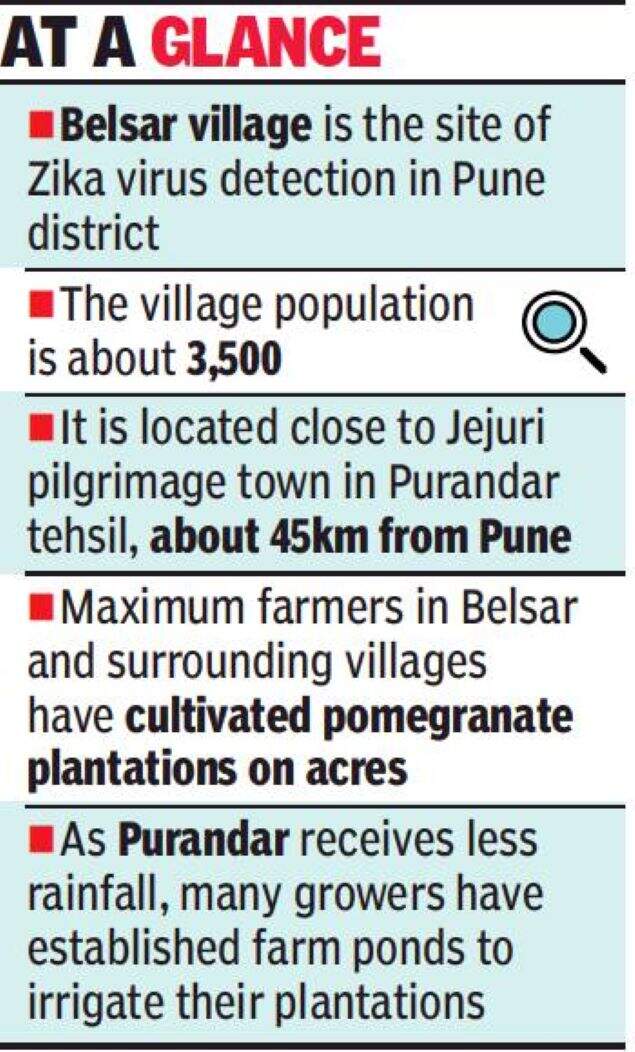Maharashtra reports its first Zika virus case, 50-year-old Belsar village woman tests positive

Zika virus is transmitted to people through the bite of an infected mosquito, mainly Aedes aegypti, which is also the vector for dengue and chikungunya. (Representative image)
PUNE: Maharashtra officially confirmed its first Zika virus case — a mosquito-borne viral infection — on Saturday.
The blood sample of a 50-year-old woman, a resident of Belsar village (Purandar taluka) in Pune district, tested positive for Zika-chikungunya co-infection at the Indian Council of Medical Research-National Institute of Virology (ICMR-NIV), a premier virus research laboratory, here late on Friday.

Her blood sample was drawn as a part of the routine surveillance to rule out mosquito-borne illnesses after some of the villagers showed dengue/chikungunya-like symptoms in Belsar and Parinche villages in Purandar taluka from early July.
Zika virus is transmitted to people through the bite of an infected mosquito, mainly Aedes aegypti, which is also the vector for dengue and chikungunya.
After the detection of the first Zika virus case in Maharashtra, the state surveillance machinery has intensified the fever surveillance in seven other surrounding villages, including Belsar (Purandar), where the woman resides with her family members, to contain the disease.
“The woman is a homemaker with no travel history. She had onset of symptoms on July 14. The symptoms included fever, joint pain, headache, and eye and body pain. She has completely recovered and has no symptoms now. None of her family members have any symptoms either,” state surveillance officer Pradip Awate said.
The ICMR-NIV's preliminary investigations suggested a mixed outbreak of dengue, chikungunya, and Zika with the dominance of chikungunya in Belsar village.
“Human Zika virus case has been reported for the first time from Maharashtra. The results warrant in-depth investigations for Zika virus in this region,” Priya Abraham, director, ICMR-NIV, stated in her preliminary Zika investigation report.
The virus detection has once again reinforced the importance of fever surveillance to pick up viral diseases. “A team of ICMR-NIV visited Belsare and Parinche villages on July 27-29 after blood samples of three villagers, drawn as a part of the fever surveillance, tested positive for chikungunya on July 16,” Awate said.
The team collected blood samples of another 51 villagers against suspicion of chikungunya. The samples were tested for chikungunya, dengue and Zika virus using the real-time RTPCR test at the ICMR-NIV.
“Among the 41 of the 51 samples for which all results are available, the blood samples from 25 cases were positive for chikungunya. Three were positive for dengue and one sample was positive for the Zika as well as chikungunya,” the ICMR-NIV report stated.
ICMR-NIV entomology team visited Belsar, Shivri, Supe (Khurd) and Mashiras to detect the presence of the Aedes aegypti mosquito in and around the patients’ houses.
Vector studies revealed that all the visited areas were positive for the presence of Aedes aegypti larvae. The vector breeding was mainly encountered in plastic drums. All the positive containers (having larvae of Aedes aegypti) were outside the houses.
“Besides, traders from Kerala come to these villages to purchase pomegranate regularly. Farmers also send their harvest or fruits to Kerala markets. We suspect that (the Zika virus) might have come from there. Our investigation is still on,” said Ayush Prasad, chief executive officer of the Zilla Parishad.
Kerala started reporting cases of Zika virus from early July this year. The southern state has registered 61 Zika cases this year, so far.
The first case of the Zika virus was reported in India in 2017 in Gujarat and was later found in Tamil Nadu. Large outbreaks occurred in Rajasthan and Madhya Pradesh in late 2018.
Dhiraj Jagatap, the deputy sarpanch of Belsar village, said, “The number of fever patients in the village has increased in the last two weeks. Every year, we report a sizable number of dengue and chikungunya cases.”
The blood sample of a 50-year-old woman, a resident of Belsar village (Purandar taluka) in Pune district, tested positive for Zika-chikungunya co-infection at the Indian Council of Medical Research-National Institute of Virology (ICMR-NIV), a premier virus research laboratory, here late on Friday.

Her blood sample was drawn as a part of the routine surveillance to rule out mosquito-borne illnesses after some of the villagers showed dengue/chikungunya-like symptoms in Belsar and Parinche villages in Purandar taluka from early July.
Zika virus is transmitted to people through the bite of an infected mosquito, mainly Aedes aegypti, which is also the vector for dengue and chikungunya.
After the detection of the first Zika virus case in Maharashtra, the state surveillance machinery has intensified the fever surveillance in seven other surrounding villages, including Belsar (Purandar), where the woman resides with her family members, to contain the disease.
“The woman is a homemaker with no travel history. She had onset of symptoms on July 14. The symptoms included fever, joint pain, headache, and eye and body pain. She has completely recovered and has no symptoms now. None of her family members have any symptoms either,” state surveillance officer Pradip Awate said.
The ICMR-NIV's preliminary investigations suggested a mixed outbreak of dengue, chikungunya, and Zika with the dominance of chikungunya in Belsar village.
“Human Zika virus case has been reported for the first time from Maharashtra. The results warrant in-depth investigations for Zika virus in this region,” Priya Abraham, director, ICMR-NIV, stated in her preliminary Zika investigation report.
The virus detection has once again reinforced the importance of fever surveillance to pick up viral diseases. “A team of ICMR-NIV visited Belsare and Parinche villages on July 27-29 after blood samples of three villagers, drawn as a part of the fever surveillance, tested positive for chikungunya on July 16,” Awate said.
The team collected blood samples of another 51 villagers against suspicion of chikungunya. The samples were tested for chikungunya, dengue and Zika virus using the real-time RTPCR test at the ICMR-NIV.
“Among the 41 of the 51 samples for which all results are available, the blood samples from 25 cases were positive for chikungunya. Three were positive for dengue and one sample was positive for the Zika as well as chikungunya,” the ICMR-NIV report stated.
ICMR-NIV entomology team visited Belsar, Shivri, Supe (Khurd) and Mashiras to detect the presence of the Aedes aegypti mosquito in and around the patients’ houses.
Vector studies revealed that all the visited areas were positive for the presence of Aedes aegypti larvae. The vector breeding was mainly encountered in plastic drums. All the positive containers (having larvae of Aedes aegypti) were outside the houses.
“Besides, traders from Kerala come to these villages to purchase pomegranate regularly. Farmers also send their harvest or fruits to Kerala markets. We suspect that (the Zika virus) might have come from there. Our investigation is still on,” said Ayush Prasad, chief executive officer of the Zilla Parishad.
Kerala started reporting cases of Zika virus from early July this year. The southern state has registered 61 Zika cases this year, so far.
The first case of the Zika virus was reported in India in 2017 in Gujarat and was later found in Tamil Nadu. Large outbreaks occurred in Rajasthan and Madhya Pradesh in late 2018.
Dhiraj Jagatap, the deputy sarpanch of Belsar village, said, “The number of fever patients in the village has increased in the last two weeks. Every year, we report a sizable number of dengue and chikungunya cases.”
FacebookTwitterLinkedinEMail
Start a Conversation
end of article
Quick Links
Delhi Air PollutionDelhi TemperatureChennai WeatherBangalore TemperatureCovid vaccination centres in DelhiCoronavirus in DelhiRTPCR test in GurgaonHyderabad RainPollution level in BangaloreDelhi SmogDelhi TemperatureNoida AQIGurgaon AQI todayFire in MumbaiMumbai RainsCovid 19 RT PCR Test in NoidaDelhi AQI todaySrinagar encounter

